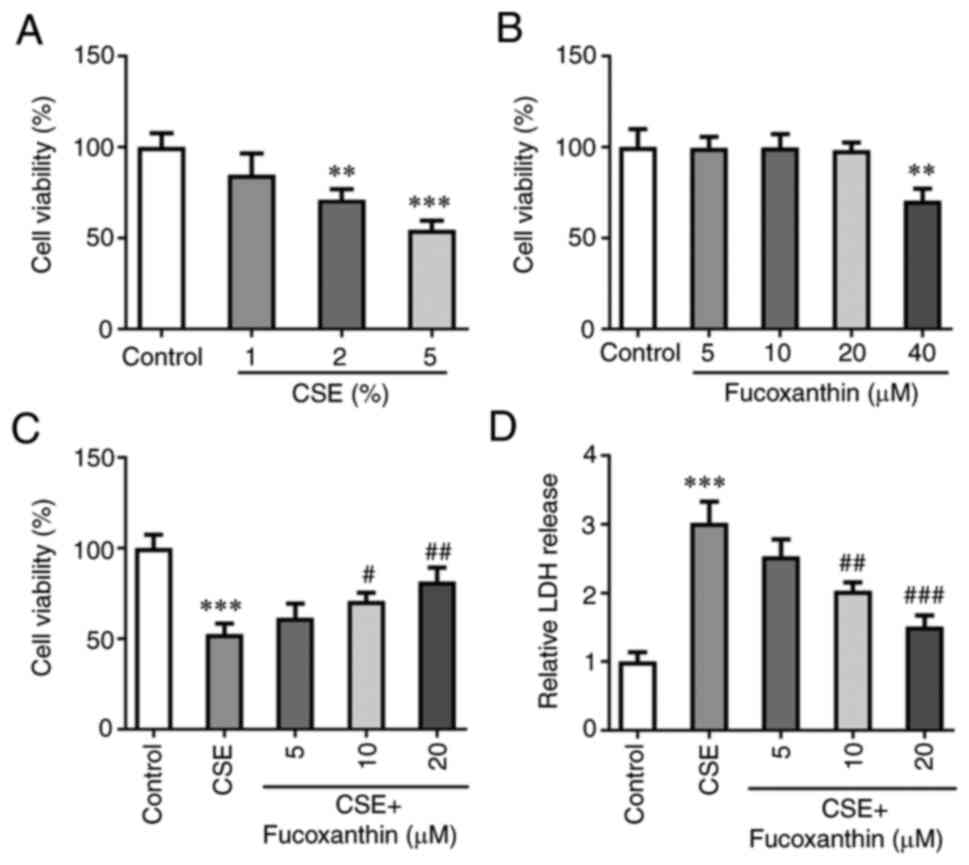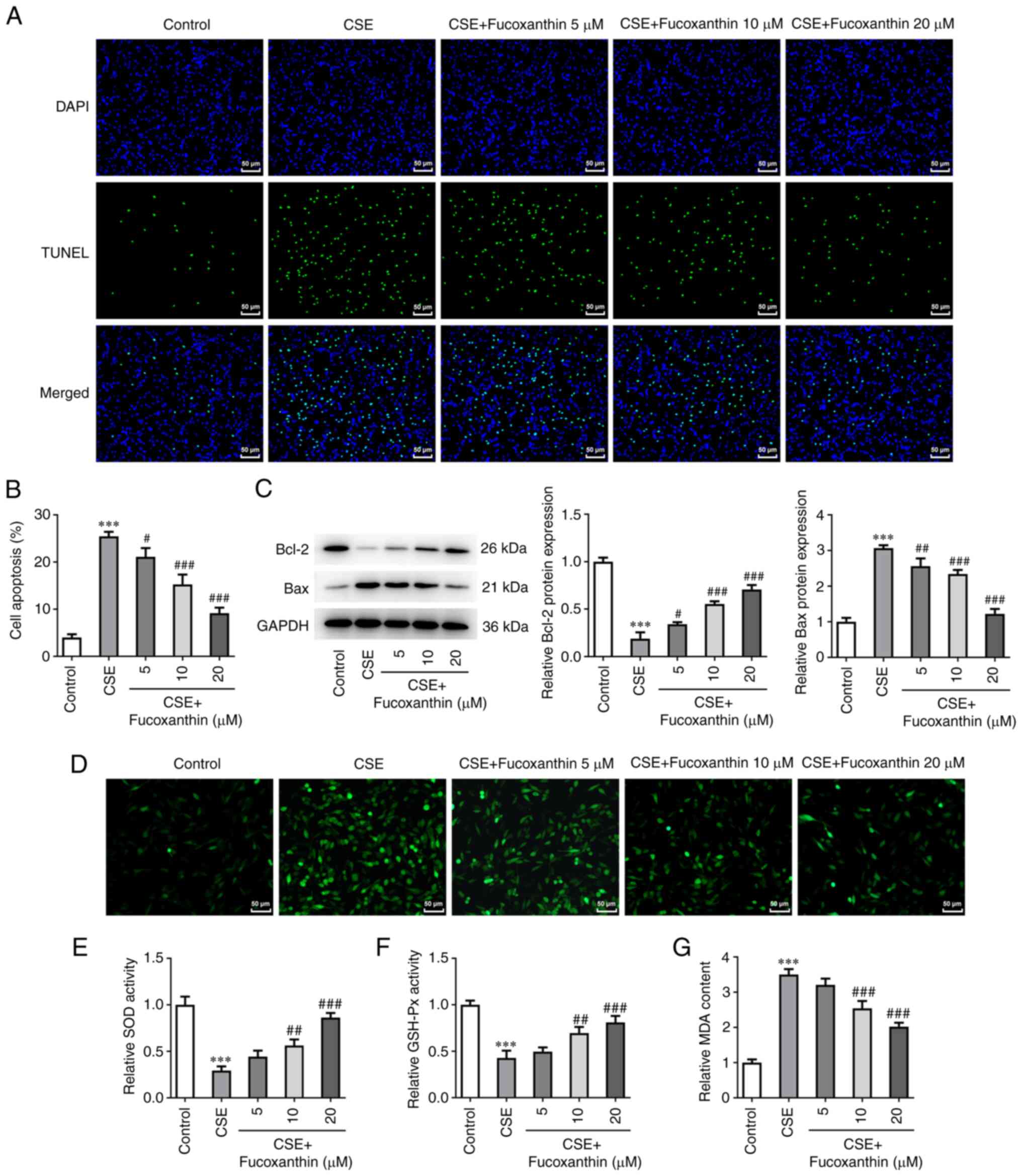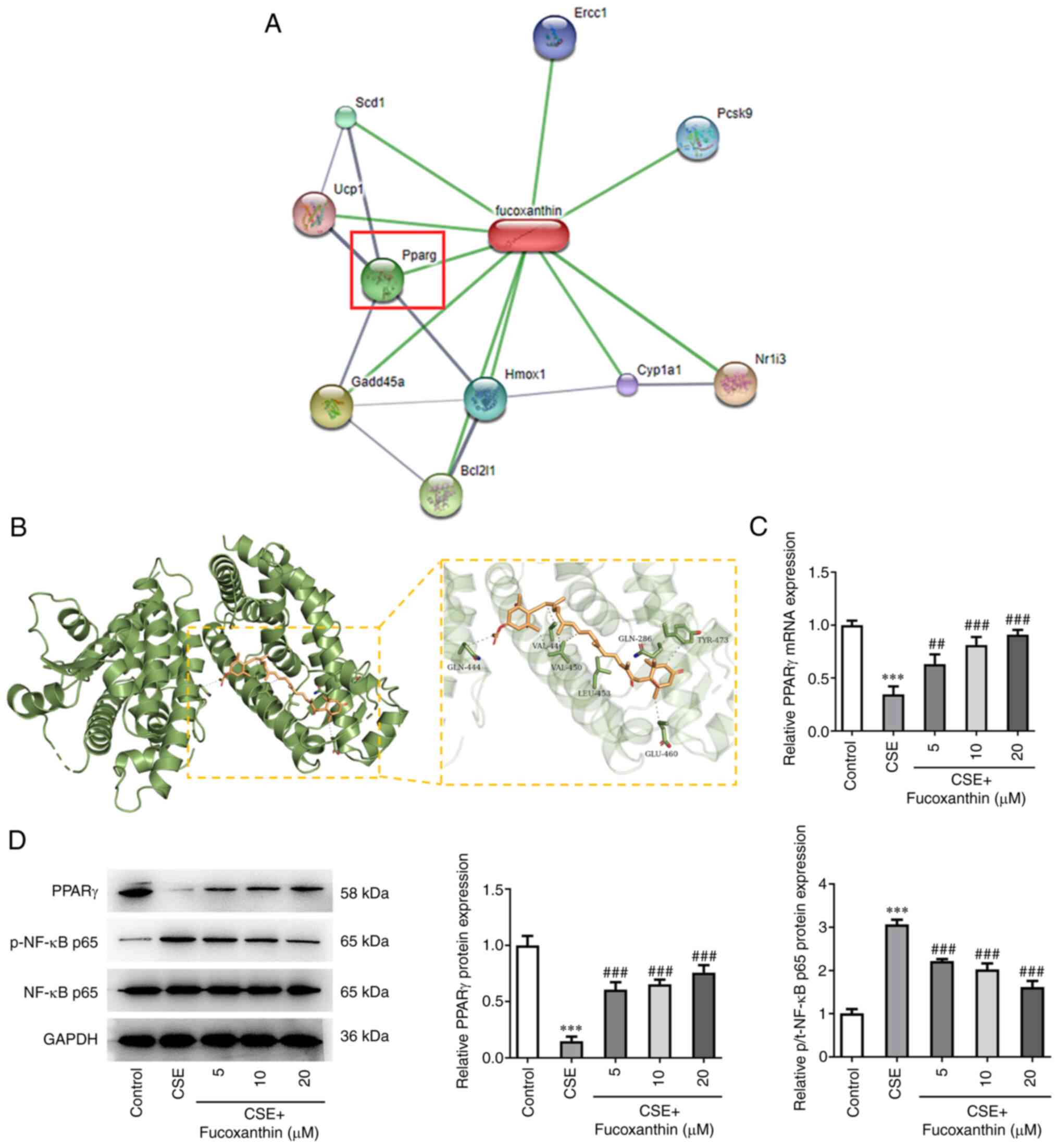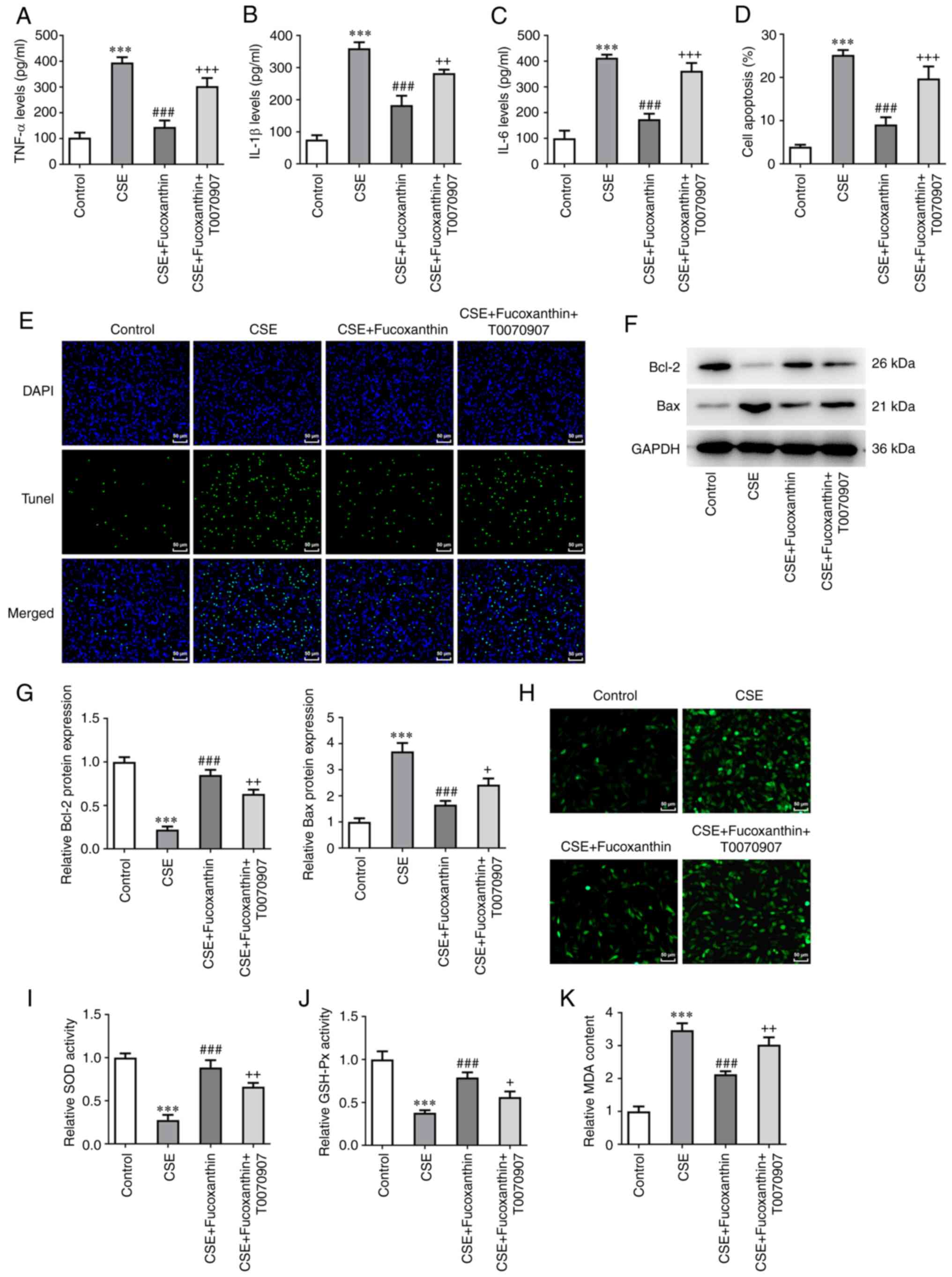|
1
|
Rabe KF and Watz H: Chronic obstructive
pulmonary disease. Lancet. 389:1931–1940. 2017.PubMed/NCBI View Article : Google Scholar
|
|
2
|
Labaki WW and Rosenberg SR: Chronic
obstructive pulmonary disease. Ann Intern Med. 173:ITC17–ITC32.
2020.PubMed/NCBI View Article : Google Scholar
|
|
3
|
Vogelmeier CF, Criner GJ, Martinez FJ,
Anzueto A, Barnes PJ, Bourbeau J, Celli BR, Chen R, Decramer M,
Fabbri LM, et al: Global strategy for the diagnosis, management,
and prevention of chronic obstructive lung disease 2017 report.
GOLD executive summary. Am J Respir Crit Care Med. 195:557–582.
2017.PubMed/NCBI View Article : Google Scholar
|
|
4
|
Brandsma CA, Van den Berge M, Hackett TL,
Brusselle G and Timens W: Recent advances in chronic obstructive
pulmonary disease pathogenesis: From disease mechanisms to
precision medicine. J Pathol. 250:624–635. 2020.PubMed/NCBI View Article : Google Scholar
|
|
5
|
Tashkin DP: Smoking cessation in chronic
obstructive pulmonary disease. Semin Respir Crit Care Med.
36:491–507. 2015.PubMed/NCBI View Article : Google Scholar
|
|
6
|
Bae M, Kim MB, Park YK and Lee JY: Health
benefits of fucoxanthin in the prevention of chronic diseases.
Biochim Biophys Acta Mol Cell Biol Lipids.
1865(158618)2020.PubMed/NCBI View Article : Google Scholar
|
|
7
|
Liu M, Li W, Chen Y, Wan X and Wang J:
Fucoxanthin: A promising compound for human inflammation-related
diseases. Life Sci. 255(117850)2020.PubMed/NCBI View Article : Google Scholar
|
|
8
|
Gammone MA and D'Orazio N: Anti-obesity
activity of the marine carotenoid fucoxanthin. Mar Drugs.
13:2196–2214. 2015.PubMed/NCBI View Article : Google Scholar
|
|
9
|
Meresse S, Fodil M, Fleury F and Chenais
B: Fucoxanthin, a marine-derived carotenoid from brown seaweeds and
microalgae: A promising bioactive compound for cancer therapy. Int
J Mol Sci. 21(9273)2020.PubMed/NCBI View Article : Google Scholar
|
|
10
|
Li X, Huang R, Liu K, Li M, Luo H, Cui L,
Huang L and Luo L: Fucoxanthin attenuates LPS-induced acute lung
injury via inhibition of the TLR4/MyD88 signaling axis. Aging
(Albany NY). 13:2655–2667. 2020.PubMed/NCBI View Article : Google Scholar
|
|
11
|
Ma SY, Park WS, Lee DS, Choi G, Yim MJ,
Lee JM, Jung WK, Park SG, Seo SK, Park SJ, et al: Fucoxanthin
inhibits profibrotic protein expression in vitro and attenuates
bleomycin-induced lung fibrosis in vivo. Eur J Pharmacol.
811:199–207. 2017.PubMed/NCBI View Article : Google Scholar
|
|
12
|
Wu SJ, Liou CJ, Chen YL, Cheng SC and
Huang WC: Fucoxanthin ameliorates oxidative stress and airway
inflammation in tracheal epithelial cells and asthmatic mice.
Cells. 10(1311)2021.PubMed/NCBI View Article : Google Scholar
|
|
13
|
Mei C, Zhou S, Zhu L, Ming J, Zeng F and
Xu R: Antitumor effects of laminaria extract fucoxanthin on lung
cancer. Mar Drugs. 15(39)2017.PubMed/NCBI View Article : Google Scholar
|
|
14
|
Feng H, Yin Y, Zheng R and Kang J:
Rosiglitazone ameliorated airway inflammation induced by cigarette
smoke via inhibiting the M1 macrophage polarization by activating
PPARgamma and RXRalpha. Int Immunopharmacol.
97(107809)2021.PubMed/NCBI View Article : Google Scholar
|
|
15
|
Qiu JF, Ma N, He ZY, Zhong XN, Zhang JQ,
Bai J, Deng JM, Tang XJ, Luo ZL, Huang M, et al: Erythromycin
inhibits cigarette smoke-induced inflammation through regulating
the PPARgamma/NF-kappaB signaling pathway in macrophages. Int
Immunopharmacol. 96(107775)2021.PubMed/NCBI View Article : Google Scholar
|
|
16
|
Solleti SK, Simon DM, Srisuma S, Arikan
MC, Bhattacharya S, Rangasamy T, Bijli KM, Rahman A, Crossno JT Jr,
Shapiro ST and Mariani TJ: Airway epithelial cell PPARgamma
modulates cigarette smoke-induced chemokine expression and
emphysema susceptibility in mice. Am J Physiol Lung Cell Mol
Physiol. 309:L293–L304. 2015.PubMed/NCBI View Article : Google Scholar
|
|
17
|
Kang SI, Ko HC, Shin HS, Kim HM, Hong YS,
Lee NH and Kim SJ: Fucoxanthin exerts differing effects on 3T3-L1
cells according to differentiation stage and inhibits glucose
uptake in mature adipocytes. Biochem Biophys Res Commun.
409:769–774. 2011.PubMed/NCBI View Article : Google Scholar
|
|
18
|
Lee AH, Shin HY, Park JH, Koo SY, Kim SM
and Yang SH: Fucoxanthin from microalgae Phaeodactylum tricornutum
inhibits pro-inflammatory cytokines by regulating both NF-kappaB
and NLRP3 inflammasome activation. Sci Rep. 11(543)2021.PubMed/NCBI View Article : Google Scholar
|
|
19
|
Dang X, He B, Ning Q, Liu Y, Guo J, Niu G
and Chen M: Alantolactone suppresses inflammation, apoptosis and
oxidative stress in cigarette smoke-induced human bronchial
epithelial cells through activation of Nrf2/HO-1 and inhibition of
the NF-κB pathways. Respir Res. 21(95)2020.PubMed/NCBI View Article : Google Scholar
|
|
20
|
O'Boyle NM, Banck M, James CA, Morley C,
Vandermeersch T and Hutchison GR: Open babel: An open chemical
toolbox. J Cheminform. 3(33)2011.PubMed/NCBI View Article : Google Scholar
|
|
21
|
Berman H, Henrick K and Nakamura H:
Announcing the worldwide protein data bank. Nat Struct Biol.
10(980)2003.PubMed/NCBI View Article : Google Scholar
|
|
22
|
Morris GM, Huey R, Lindstrom W, Sanner MF,
Belew RK, Goodsell DS and Olson AJ: AutoDock4 and AutoDockTools4:
Automated docking with selective receptor flexibility. J Comput
Chem. 30:2785–2791. 2009.PubMed/NCBI View Article : Google Scholar
|
|
23
|
Livak KJ and Schmittgen TD: Analysis of
relative gene expression data using real-time quantitative PCR and
the 2(-Delta Delta C(T)) method. Methods. 25:402–408.
2001.PubMed/NCBI View Article : Google Scholar
|
|
24
|
Chen L, Yuan X, Zou L, Peng J and Hu X:
Effects of 1,25-Dihydroxyvitamin D3 on the prevention of chronic
obstructive pulmonary disease (COPD) in rats exposed to air
pollutant particles less than 2.5 micrometers in diameter (PM2.5).
Med Sci Monit. 24:356–362. 2018.PubMed/NCBI View Article : Google Scholar
|
|
25
|
Kohansal R, Martinez-Camblor P, Agusti A,
Buist AS, Mannino DM and Soriano JB: The natural history of chronic
airflow obstruction revisited: An analysis of the Framingham
offspring cohort. Am J Respir Crit Care Med. 180:3–10.
2009.PubMed/NCBI View Article : Google Scholar
|
|
26
|
Kankaanranta H, Harju T, Kilpelainen M,
Mazur W, Lehto JT, Katajisto M, Peisa T, Meinander T and Lehtimäki
L: Diagnosis and pharmacotherapy of stable chronic obstructive
pulmonary disease: The finnish guidelines. Basic Clin Pharmacol
Toxicol. 116:291–307. 2015.PubMed/NCBI View Article : Google Scholar
|
|
27
|
Vestbo J, Hurd SS, Agusti AG, Jones PW,
Vogelmeier C, Anzueto A, Barnes PJ, Fabbri LM, Martinez FJ,
Nishimura M, et al: Global strategy for the diagnosis, management,
and prevention of chronic obstructive pulmonary disease: GOLD
executive summary. Am J Respir Crit Care Med. 187:347–365.
2013.PubMed/NCBI View Article : Google Scholar
|
|
28
|
Lopez-Campos JL, Tan W and Soriano JB:
Global burden of COPD. Respirology. 21:14–23. 2016.PubMed/NCBI View Article : Google Scholar
|
|
29
|
Barnes PJ: Oxidative stress-based
therapeutics in COPD. Redox Biol. 33(101544)2020.PubMed/NCBI View Article : Google Scholar
|
|
30
|
Chen W, Zhang H and Liu Y:
Anti-inflammatory and apoptotic signaling effect of fucoxanthin on
benzo(A)pyrene-induced lung cancer in mice. J Environ Pathol
Toxicol Oncol. 38:239–251. 2019.PubMed/NCBI View Article : Google Scholar
|
|
31
|
Yang X, Guo G, Dang M, Yan L, Kang X, Jia
K and Ren H: Assessment of the therapeutic effects of fucoxanthin
by attenuating inflammation in ovalbumin-induced asthma in an
experimental animal model. J Environ Pathol Toxicol Oncol.
38:229–238. 2019.PubMed/NCBI View Article : Google Scholar
|
|
32
|
Lee CY, Chen SP, Huang-Liu R, Gau SY, Li
YC, Chen CJ, Chen WY, Wu CN and Kuan YH: Fucoxanthin decreases
lipopolysaccharide-induced acute lung injury through the inhibition
of RhoA activation and the NF-κB pathway. Environ Toxicol.
37:2214–2222. 2022.PubMed/NCBI View Article : Google Scholar
|
|
33
|
Lin HV, Tsou YC, Chen YT, Lu WJ and Hwang
PA: Effects of low-molecular-weight fucoidan and high stability
fucoxanthin on glucose homeostasis, lipid metabolism, and liver
function in a mouse model of type II diabetes. Mar Drugs.
15(113)2017.PubMed/NCBI View Article : Google Scholar
|
|
34
|
Kwak N, Lee KH, Woo J, Kim J, Lee CH and
Yoo CG: Synergistic cycles of protease activity and inflammation
via PPARγ degradation in chronic obstructive pulmonary disease. Exp
Mol Med. 53:947–955. 2021.PubMed/NCBI View Article : Google Scholar
|
|
35
|
Pan K, Lu J and Song Y: Artesunate
ameliorates cigarette smoke-induced airway remodelling via
PPAR-γ/TGF-β1/Smad2/3 signalling pathway. Respir Res.
22(91)2021.PubMed/NCBI View Article : Google Scholar
|
|
36
|
Li Q, Sun J, Mohammadtursun N, Wu J, Dong
J and Li L: Curcumin inhibits cigarette smoke-induced inflammation
via modulating the PPARγ-NF-κB signaling pathway. Food Funct.
10:7983–7994. 2019.PubMed/NCBI View Article : Google Scholar
|
|
37
|
Ogasawara N, Kojima T, Go M, Ohkuni T,
Koizumi J, Kamekura R, Masaki T, Murata M, Tanaka S, Fuchimoto J,
et al: PPARgamma agonists upregulate the barrier function of tight
junctions via a PKC pathway in human nasal epithelial cells.
Pharmacol Res. 61:489–498. 2010.PubMed/NCBI View Article : Google Scholar
|
|
38
|
Koo SY, Hwang JH, Yang SH, Um JI, Hong KW,
Kang K, Pan CH, Hwang KT and Kim SM: Anti-obesity effect of
standardized extract of microalga phaeodactylum tricornutum
containing fucoxanthin. Mar Drugs. 17(311)2019.PubMed/NCBI View Article : Google Scholar
|
|
39
|
Kim KN, Heo SJ, Yoon WJ, Kang SM, Ahn G,
Yi TH and Jeon YJ: Fucoxanthin inhibits the inflammatory response
by suppressing the activation of NF-κB and MAPKs in
lipopolysaccharide-induced RAW 264.7 macrophages. Eur J Pharmacol.
649:369–375. 2010.PubMed/NCBI View Article : Google Scholar
|
|
40
|
Tan CP and Hou YH: First evidence for the
anti-inflammatory activity of fucoxanthin in high-fat-diet-induced
obesity in mice and the antioxidant functions in PC12 cells.
Inflammation. 37:443–450. 2014.PubMed/NCBI View Article : Google Scholar
|
|
41
|
Seo MJ, Seo YJ, Pan CH, Lee OH, Kim KJ and
Lee BY: Fucoxanthin suppresses lipid accumulation and ROS
production during differentiation in 3T3-L1 adipocytes. Phytother
Res. 30:1802–1808. 2016.PubMed/NCBI View
Article : Google Scholar
|
|
42
|
Maeda H, Hosokawa M, Sashima T, Takahashi
N, Kawada T and Miyashita K: Fucoxanthin and its metabolite,
fucoxanthinol, suppress adipocyte differentiation in 3T3-L1 cells.
Int J Mol Med. 18:147–152. 2006.PubMed/NCBI
|



















